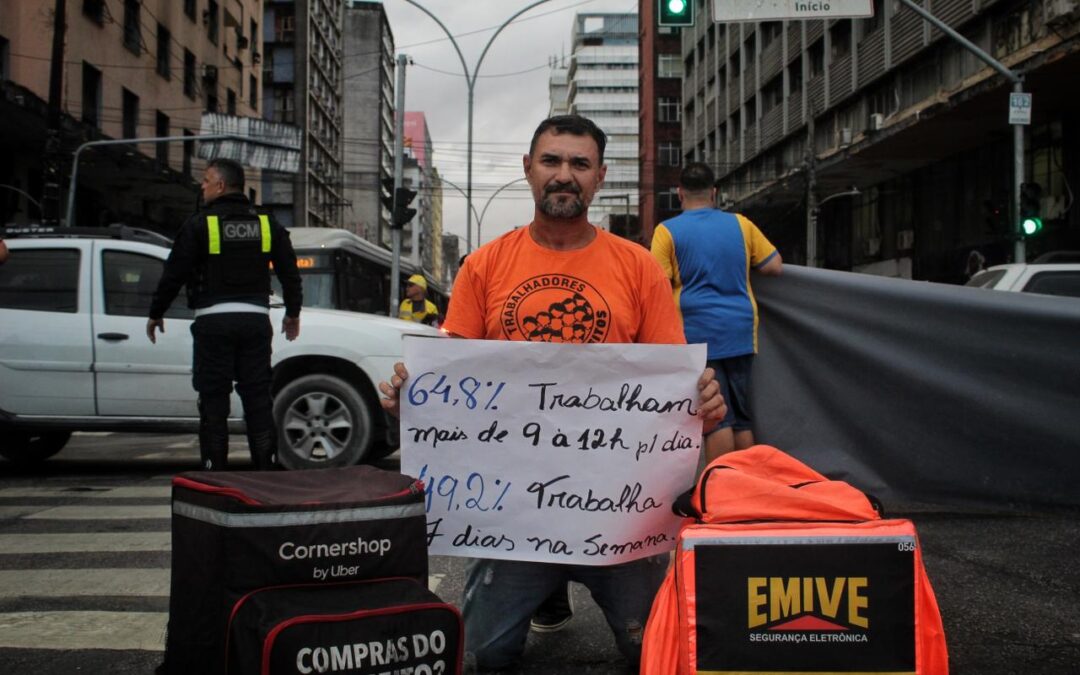Delivery drivers at iFood in Brazil say they face exhausting workdays, low pay, lack of adequate company support and poor health conditions. In fact, wages that do not cover the cost of living -–or even do not meet the local minimum wage law—force drivers to work longer hours, leading to unsafe or hazardous working conditions and accidents, say experts and app-based drivers.
“There are dangerous conditions on the road with intense traffic that increases the risk of accidents,” says Beethoven Gomes de Oliveira, an app driver in João Pessoa. “This is also true for mototaxi workers. And the app companies don’t care about us workers, they treat us as if we are disposable.”

Delivery drivers say they suffer from exhausting workdays, low pay and poor health conditions. Credit: Paloma Luna
Injuries for the low-wage delivery drivers are on the rise. São Paulo Hospital reports that the percentage of trauma patients rose from 20 percent of motorcycle drivers in 2016 to 80 percent in 2022. Nearly seven people die riding a motorbike on average every day in São Paulo, which health and safety experts attribute to the rapid expansion of food delivery apps.
Workers Fear Poor Treatment Could Expand
Motorcycle and bike drivers are among Brazil’s 1.6 million app drivers and delivery people, a figure that grew rapidly after COVID as workers seek jobs in the informal economy to sustain themselves and their families. And iFood drivers delivered more than 100 million orders in August.
iFood is owned by the Dutch investment company Prosus, a subsidiary of South African tech giant Naspers, and dominates the Brazilian food delivery market with an approximately 80 percent share. iFood anticipates total revenue from its financial arm to rise 52 percent next year-–an amount workers say could easily cover living wages and safer working conditions.
“Pay is very low, not enough to meet our basic needs. For example, maintenance costs are very high, alongside vehicle insurance and food,” says Gomes de Oliveira, leader of the João Pessoa Municipal Delivery Workers’ Commission. We are out on the street all day–12 to 15 hours–to make 100 reales (approximately $18), and even that is a struggle.”
Fabricio Bloisi, iFood CEO, was appointed Naspers joint CEO in July, a move that app-based workers say may spread a business model that destroys their lives.
During a recent shareholders’ meeting, the Shareholder Association for Research and Education (SHARE) raised concerns about the treatment of delivery workers under Bloisi during his iFood tenure. The wider Naspers group owns the food delivery services Mr D Food, Superbalist, Takealot and Delivery Hero (25 percent).
iFood Stalls Negotiations, Basic Democratic Rights
App-based workers, the government and iFood worked together in 2023 on legislation to regulate the digital platform sector—but iFood did not negotiate in good faith with workers during the four-month process, stalling negotiations until recently when the company reached out to the Ministry of Labor.
Even as workers struggled for decent wages and safer working conditions, they say iFood has opposed their democratic right to form a union and stand together in their struggle. A FairWork report finds no evidence the platform ensures freedom of association and the expression of workers’ voice, and no evidence that it supports democratic governance.
Union supporters say they also are targeted by the company’s algorithm, with iFood blocking the accounts of leaders who question their organizing. Delivery drivers have regularly face inaccurate algorithims that cut their pay—or even deny them jobs.
“There are many algorithmic issues: accounts being blocked or deactivated, payments charged incorrectly or to the wrong person, deviations from the route without pay,” says Gomes de Oliveira.
A key part of drivers’ campaign for fairness is addressing arbitrary and unfair algorithms. Delivery workers suffer from bans from the app, without the right to defend themselves.
Company Should ‘Go Beyond Pursuit of Profits’
A 2022 report shows how far iFood was willing to control workers, including monitoring WhatsApp groups, creating fake profiles on social media and infiltrating with an agent. “The Hidden Propaganda Machine of iFood,” found the company hired an auditor specializing in human rights and spent over $1.1 million on research to determine strategies that would not increase the app’s fees during strikes.
As a result of the report and investigations conducted by the Federal Public Ministry and the Labor Public Ministry, iFood and its advertising agencies signed a Conduct Adjustment Term in July 2023. The company agreed it would not increase the fare for trips during a strike—an action delivery workers say often happened, resulting in “strikebreakers.” iFood also is obliged not to intervene directly or indirectly in workers’ organizations, and cannot influence the creation, operation and agendas of associations and unions.
Yet drivers say that iFood continues to violate international treaties, including the right for everyone, without discrimination, to equal pay for equal work and to form and join unions for the protection of their interests.
As the National App Delivery Workers’ Alliance said: “We believe that business leadership should go beyond the pursuit of profits. It should include a commitment to the well-being of workers, ensuring dignified working conditions and promoting practices that respect human rights.

